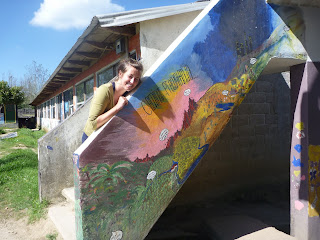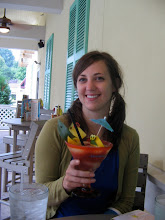
I had an incredible experience today. I went to Caracol de Resistencia y Rebeldia por la Humanidad, one of the five headquarters for the Juntas de Buen Gobierno, the leaders of the neo-Zapatista movement in Chiapas. The caracoles (compounds...literal translation is snail or observatory) house alternative schools, clinics, pharmacies, artisan workshops, and land for agriculture (they grow delicious, organic coffee.) They exist to promote the continuation of indigenous culture, language (Tzotzil and Tzeltal are spoken here more than Spanish), and tradition, and additionally, to support the poor who have been removed from ownership of their native lands. They wish to have a government autonomous from the Mexican government, as well as from any other government who bases its economy and socialization on capitalism.
I was pretty intimidated when I arrived. I came with two friends from Argentina and France, and their Spanish-speaking abilities helped me feel better. I was too nervous to talk much at first. They checked out our passports and asked us why were were there, what professions we held, and if we were aligned with any particular political organizations. They were welcoming, but very bureaucratic and all wearing ski masks... My friend explained to me, the masks are not just to hide the identities of the rebels, but also to make race and gender irrelevant. Despite this knowledge, I was on edge (and kept me from communicating with much fluidity in Spanish).

The leaders talked to us for almost an hour, answering some of our questions about their philosophies, alliances, and organization, but were somewhat secretive and responded with very general answers at times. I appreciate the amount of time they spent with us however.
They allowed us to wander around the Caracol. We were permitted to take photos of the place as long as no one's face was revealed or license plates were seen in the photos. We had to carry a permission slip with us everywhere we went and even had to present it a few times.

Seeing the school was great. About 150 students attend the secondary (middle-high) school and the professor teaches them together even though they vary in age from 13 to 18 years old. They were just getting out of class when we made our way over to the school. I was impressed with the attendance numbers since no one actually lives in the compound all year long and it is pretty well off the well traveled routes of Chiapas. The people living in the surrounding areas seem to have a lot of faith in this way of living. I am very much impressed with their level of organization despite being unsupported or recognized by the official Mexican government. They are giving people, otherwise ignored, a voice and an alternative means to educate themselves and I respect that immensely.

We saw the clinic as well. They use modern western medicine combined with Maya herbal medicine. They get most of their pharmaceuticals donated to them from various sympathetic organizations. I was told quite a lot of the donors are from outside of Mexico. They had a dentist working on someone when we visited the clinic, as well as rooms for gynecology, optometry, emergencies, and sick beds for 8 people. The man telling us about the place said there is rarely a day when none of these beds are occupied. There are no resident doctors or nurses in their clinic. They host visitors a few times a year, but other than that, laypeople organize the distribution of medicines and treatments as well as host health workshops a few times a month. I would not mind at all coming back with a team of health care workers to treat some of the illness in the people who seek treatment there. It would be nice to exchange my work for a few lessons in herbal medicine.
 The herbal pharmacy was my favorite part of the trip. It smelled amazing. I wish we could have had more time to talk with the workers there about their individual contributions to the cause and their skill set. However, the people populating the caracol did not volunteer information very often and seemed pretty removed from our presence in their space.
The herbal pharmacy was my favorite part of the trip. It smelled amazing. I wish we could have had more time to talk with the workers there about their individual contributions to the cause and their skill set. However, the people populating the caracol did not volunteer information very often and seemed pretty removed from our presence in their space.I just had a rare opportunity to touch an alternative means of civilization outside of what I know. I feel honored. I am curious to learn more.


No comments:
Post a Comment